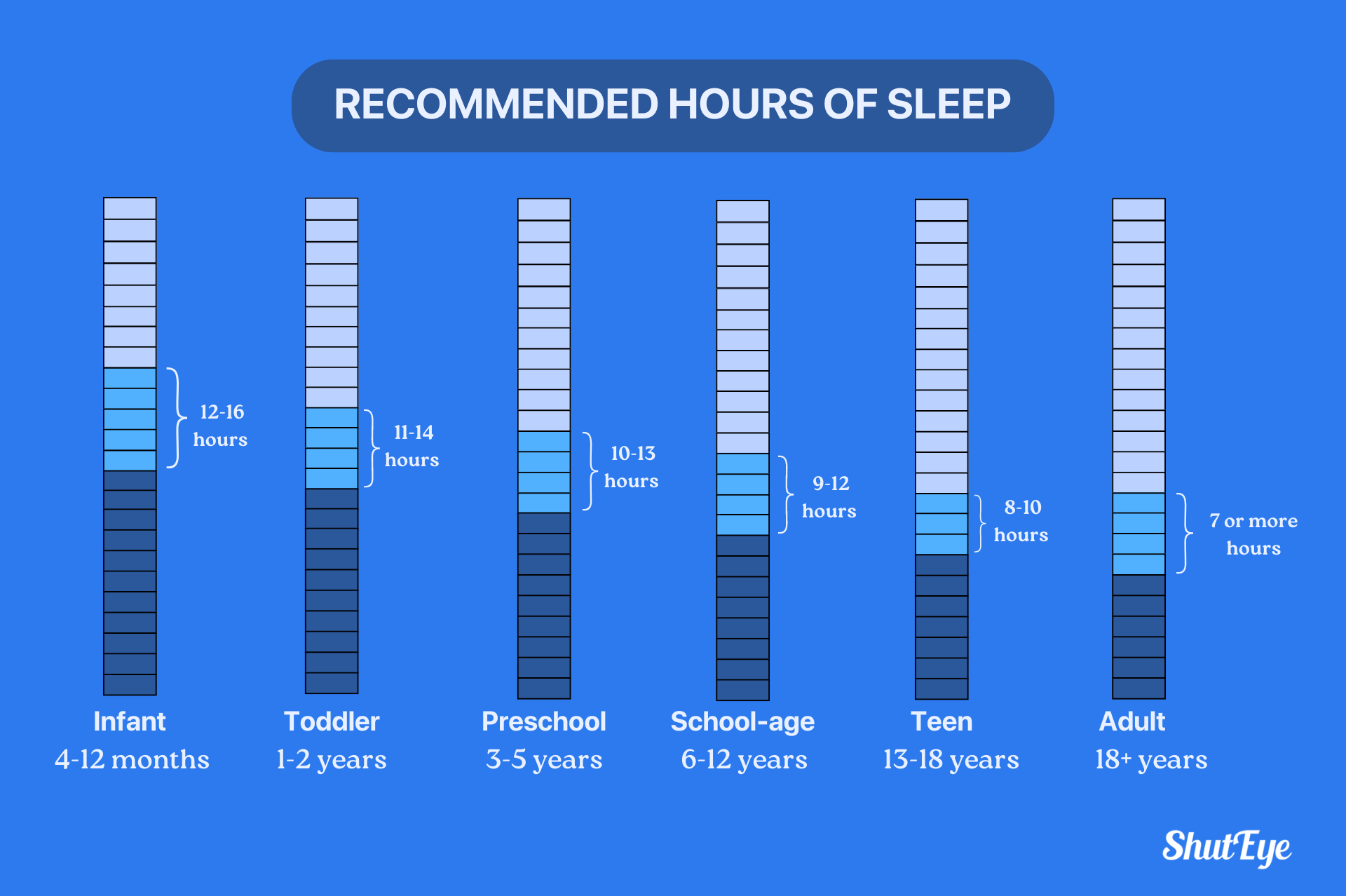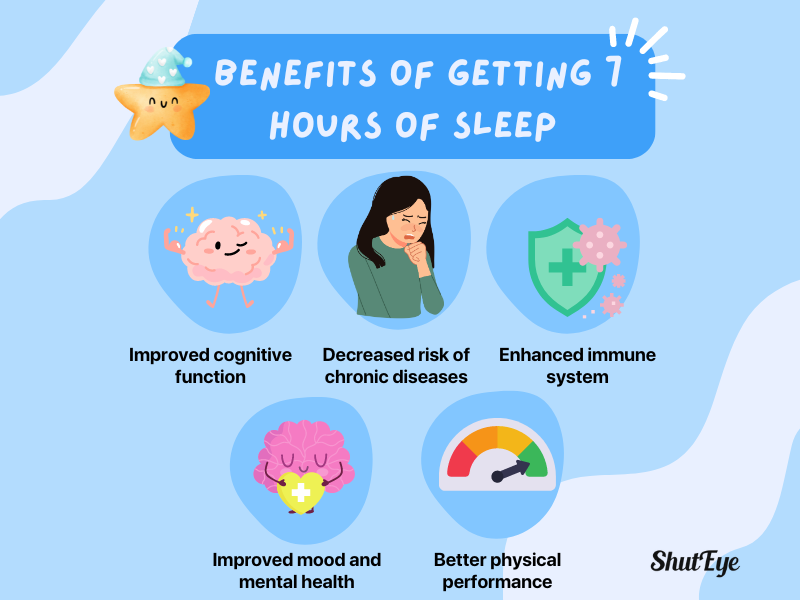


It’s early in the morning and you hear your alarm blaring, telling you it’s time to wake up. Yet your eyes feel extremely heavy and you just want to hit the snooze button. Perhaps you’re not sleeping enough. How much sleep is enough then? Is 7 hours of sleep enough?
Keep reading to find out how much sleep is truly enough for your body!
Sleep is essential for every one of us as it helps to maintain our physical and mental health.
According to the American Academy of Sleep Medicine (AASM) and Sleep Research Society (SRS), a healthy adult needs to obtain seven or more hours of sleep each night to avoid chronic sleep deprivation [1].
This being said it should be acknowledged that the recommended sleep duration varies across different age groups and circumstances. For example, if you are much younger, you are recovering from a sleep debt or you are battling an illness, it is normal to get more than 9 hours of sleep.
Below is an infographic to help you determine how many hours of sleep you need, based on your age.

You may also like:
How Much Deep Sleep Is Needed By Age?
To answer this question—it depends. Some people may feel that 7 hours of sleep is adequate while others may need more or less sleep. Everyone has different sleep needs depending on age, health, and lifestyle factors.
A research study done in 2017 found that a gene mutation could cause some people to sleep less without any health implications. The study examined the genes of three generations of a family known for being short sleepers.
Upon examination, it was discovered that there was a rare mutation in the ADBR1 gene which caused the increased activity of wake-promoting brain cells. This resulted in these people needing less than 6.5 hours of sleep per night.
So, this shows that getting 7 hours of sleep is not a hard and fast rule to follow for everyone. It is just that for most healthy adults, 7 hours is generally enough.

Sleeping for 7 hours can have positive impacts on your health, including improved cognitive function and decreased risk of certain health conditions. Here are five key health benefits of getting 7 hours of sleep:
Prioritizing 7 hours of sleep may have significant long-term benefits for your health and well-being.
If you don’t get enough sleep each night, you may wound up having sleep deprivation. When you are sleep-deprived, it can affect your overall well-being and lead to cognitive impairment.
Here are some common effects of sleep deprivation to help you understand its impact in more detail.
If you are getting poor-quality sleep on a regular basis, you may want to consider consulting a doctor. Sometimes, it could be due to sleep disorders.
When it comes to sleep, both quality and quantity are important aspects. From the start till now, we’ve solely been focusing on the quantity of sleep. The idea is that the more hours we spend sleeping, the better.
While that is true, what also matters is the quality of our sleep. We might get 7 to 9 hours of sleep each night, but if we keep waking up during those hours, it can suggest poor sleep quality.
According to a research study on sleep quality conducted by Japan’s Ministry of Health, Labour, and Welfare, five key conclusions were drawn. One of these conclusions was that ‘sleep quality is a superior sleep index to sleep quantity for assessing sleep’ [4].
Still, we can’t say that sleep quality is more important than sleep quantity based on this conclusion. Other studies prove that poor sleep quality and quantity can both affect health and prevent the risk of certain diseases such as coronary heart disease, type 2 diabetes and kidney disease [5], [6], [7].
Based on all that we’ve discussed above, we should bring more of our attention to getting good quality sleep. This means that it is not only about duration but also how we feel when we wake up. Do we feel well rested or do we still want to close our eyes for a bit longer? Are we more energized during the day?
To help you enhance your sleep quality, here are 8 practical tips to try.
Maintaining a consistent bedtime schedule is one of the most effective ways to improve your sleep quality. When you are consistently going to bed and waking up at the same time, even on weekends, it helps your body’s internal clock or circadian rhythm to maintain synchrony with the social rhythm.
An irregular schedule would cause sleep difficulties and decrease alertness as your body clock is not able to keep up with the demands of daytime activities and duties [8].
Discover the best time to go to bed and wake up with our sleep calculator today.

Avoid going to bed stressed or anxious. Lying in bed and overthinking about work or personal issues can keep you awake far longer than you’d like. Before you know it, it’s 3 a.m., and you’re still wide awake.
You want to create a calming pre-sleep routine by engaging in relaxing activities. These activities can be reading, taking a warm bath, or practicing mindfulness exercises like meditation or deep breathing.
This will signal to your body that it’s time to unwind, reducing stress and anxiety.

It is also best to avoid eating heavy foods when it’s close to bedtime. Your body needs at least a few hours to properly digest the food you’ve eaten.
If you eat and decide to go to sleep immediately, you may wake up suddenly with discomfort, indigestion, or acid reflux.
If you are feeling hungry and must eat, go for a light snack that’s easy to digest (e.g. a piece of fruit or a cup of yogurt).
Did you know that your sleep environment can also affect the quality of your rest? If you have an uncomfortable mattress or pillow, the discomfort may wake you up at night.
It’s important to get a comfortable mattress and pillow that will not leave you with neck or back pain. Keeping your room dark, quiet, and at a cool temperature can also help you to fall asleep faster.
You may also consider using things such as blackout curtains, earplugs, or white noise sounds as sleep aids. ShutEye® offers a variety of sleep sounds such as white noise, nature sounds and much more. Try it now for free!

Regularly exercising may also help to improve sleep quality. Exercise raises your core body temperature. As it begins to drop 30 to 90 minutes after your workout, it naturally encourages sleepiness, helping you fall asleep more easily.
That said, it’s important to ensure that you are not exercising too close to bedtime as it raises your heart rate, making it harder to relax. Try to exercise about 3-4 hours before going to sleep to give your body ample time to settle down.
Going to bed when you’re truly tired increases the likelihood of falling asleep quickly. If you are unable to sleep, get up and do something else instead.
Forcing yourself only makes it difficult to fall asleep. It is best to train yourself to associate bed with sleep by only lying in bed when you are tired.
Naps can be beneficial especially when you are feeling restless and tired during the day. Taking a short 20-30-minute power nap is still fine. Anything beyond that should be avoided.
Also, try to avoid napping too often and late in the afternoon or evening. This is to ensure that you maintain a consistent sleep schedule.

Lastly, avoid taking caffeine late in the day. Understandably, some people may need coffee during the day to keep themselves alert at work.
Caffeine is a powerful stimulant that can interfere with your sleep if consumed too late in the day. As much as you can, try to consume it in the morning or early afternoon. That way, you can avoid feeling wide awake in bed.
To sum these points up, here is a short video that was created by our ShutEye® team.
Getting 7 hours of quality sleep each night can have a profound impact on your overall well-being. From improved cognitive function and mood to decreased risks of heart and kidney problems, it offers amazing benefits, to say the least.
By making the conscious decision to prioritize your rest, you will be able to see the positive changes and enjoy a higher quality of life. We hope that all of the tips shared were helpful. Let’s work towards making sleep our superpower today!
American Academy of Sleep Medicine (2015) Seven or more hours of sleep per night: A health necessity for adults [online]. Available at: https://aasm.org/seven-or-more-hours-of-sleep-per-night-a-health-necessity-for-adults
Cappuccio, F. P., D'Elia, L., Strazzullo, P., & Miller, M. A. (2010). Quantity and quality of sleep and incidence of type 2 diabetes: a systematic review and meta-analysis. Diabetes care, 33(2), 414–420. Available at: https://doi.org/10.2337/dc09-1124
Khan, M. A., & Al-Jahdali, H. (2023). The consequences of sleep deprivation on cognitive performance. Neurosciences (Riyadh, Saudi Arabia), 28(2), 91–99. Available at: https://doi.org/10.17712/nsj.2023.2.20220108
Kohyama, J. (2021). Which Is More Important for Health: Sleep Quantity or Sleep Quality? Children, 8(7), 542. Available at: https://doi.org/10.3390/children8070542
Lao, X. Q., Liu, X., Deng, H. B., Chan, T. C., Ho, K. F., Wang, F., Vermeulen, R., Tam, T., Wong, M. C., Tse, L., Chang, L. Y., & Yeoh, E. K. (2018). Sleep Quality, Sleep Duration, and the Risk of Coronary Heart Disease: A Prospective Cohort Study With 60,586 Adults. Journal of Clinical Sleep Medicine, 14(01), 109–117. Available at: https://doi.org/10.5664/jcsm.6894
National Institute of Health (2019) Gene identified in people who need little sleep [online]. Available at: https://www.nih.gov/news-events/nih-research-matters/gene-identified-people-who-need-little-sleep
Ma YLiang LZheng FShi LZhong BXie W. Association Between Sleep Duration and Cognitive Decline. JAMA Netw Open. 2020;3(9):e2013573. doi:10.1001/jamanetworkopen.2020.13573
Health Hub (2021) Circadian Rhythm Disorder [online]. Available at: https://www.healthhub.sg/a-z/diseases-and-conditions/circadian-rhythm-problems
Ricardo, A. C., Knutson, K., Chen, J., Appel, L. J., Bazzano, L., Carmona-Powell, E., Cohan, J., Kurella Tamura, M., Steigerwalt, S., Thornton, J. D., Weir, M., Turek, N. F., Rahman, M., Van Cauter, E., Lash, J. P., & Chronic Renal Insufficiency Cohort (CRIC) Study Investigators (2017). The Association of Sleep Duration and Quality with CKD Progression. Journal of the American Society of Nephrology : JASN, 28(12), 3708–3715. Available at: https://doi.org/10.1681/ASN.2016121288